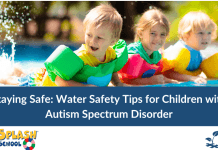A child’s birthday party can be a magical experience and create memories that last a lifetime. While most families want to include their children in the typical birthday traditions of balloons, singing and gathering, for children with autism, birthday parties are likely to create some sensory overload.
 The singing, dancing, laughing, and shouting can put them into overdrive and turn what should be an enjoyable experience into a stressful one.
The singing, dancing, laughing, and shouting can put them into overdrive and turn what should be an enjoyable experience into a stressful one.
But this doesn’t mean kids with autism should miss out on birthday parties – they just need to be approached a little differently.
Here are some ways to create a sensory-inclusive birthday party including sensory friendly gifts:
Plan Sensory-Friendly Activities
The great news is that the team at Blue Sprig Pediatrics created a wonderful list of sensory-inclusive birthday ideas that are as much fun for all children as they are accommodating for children with autism. Activity ideas include:
- Sensory-friendly slime: Playing with slime is not only an enjoyable activity but helps children develop their fine-motor skills. It can also be a relaxing activity for kids, especially those with autism.
- Sensory-themed bins: These are plastic tubs or containers filled with some material to help stimulate the senses. While they activate the senses, these bins provide a calming activity and present opportunities for learning and exploring.
- Birthday-party playdough: Playdough is fun just about any time and is another great activity to infuse into a birthday party as a creative and relaxing mode of play.
In addition to activities, consider environmental modifications to help prevent children from feeling overwhelmed, such as a venue with limited capacity, a quiet room, dimmed lighting or music that is not too loud.
Every child is different and that is true for kids with autism as well. If you are inviting a child with autism as a guest, don’t be afraid to ask their parent how to make the celebration as inclusive as possible.
Visual Transitions Are Key
After selecting sensory-friendly activities in a soothing environment, concentrate on how children will transition from one activity to the next.
Displaying a visual schedule of the party’s events on the wall and verbally reviewing the itinerary with kids will help every party-goer feel comfortable with the day’s events. Another idea is to announce the end of the activity with some advanced notice. For example, you can tell children that “in 10 minutes, we will finish arts and crafts and move to cupcakes.” This helps children visualize what will happen and when, all particularly helpful for children with autism.
Ask For Extra Help
If you are hosting an event for your own child, ask for friends and other family members to help at the party. Someone familiar with neurodiversity can help set up activities and assist with meltdowns if necessary. You can also seek consultation with your therapy team beforehand to discuss what would work best for your child.
Prepare for Meltdowns
Since birthday parties present opportunities for sensory overload, there is a possibility that your child will experience a meltdown. At Blue Sprig Pediatrics, we help parents identify signs that a child is beginning to feel overwhelmed and empower them to utilize strategies that may help avoid meltdowns. For example, parents can work together with their child to create a “break plan” which may include identifying a quiet room, using a weighted blanket, engaging with sensory-friendly toys, or taking a moment to enjoy favorite foods.
Also, consider eliminating triggers. For example, if your child is likely to have a meltdown if a balloon pops, don’t have balloons at the party, or have larger helium balloons that are less likely to pop. Or if your child does not like people singing “Happy Birthday”, set aside time to practice what that will be like ahead of time or skip the tradition all together.
Watching videos of birthday parties are also a great way to help your child prepare for the experience. Work on activities like responding when opening a present, involving them in a calendar countdown to party day, and reviewing pictures of people who will be at the party ahead of time.
With a little extra planning and expectation-setting, birthday parties can be enjoyable and happy experiences for all children including those with autism.

















